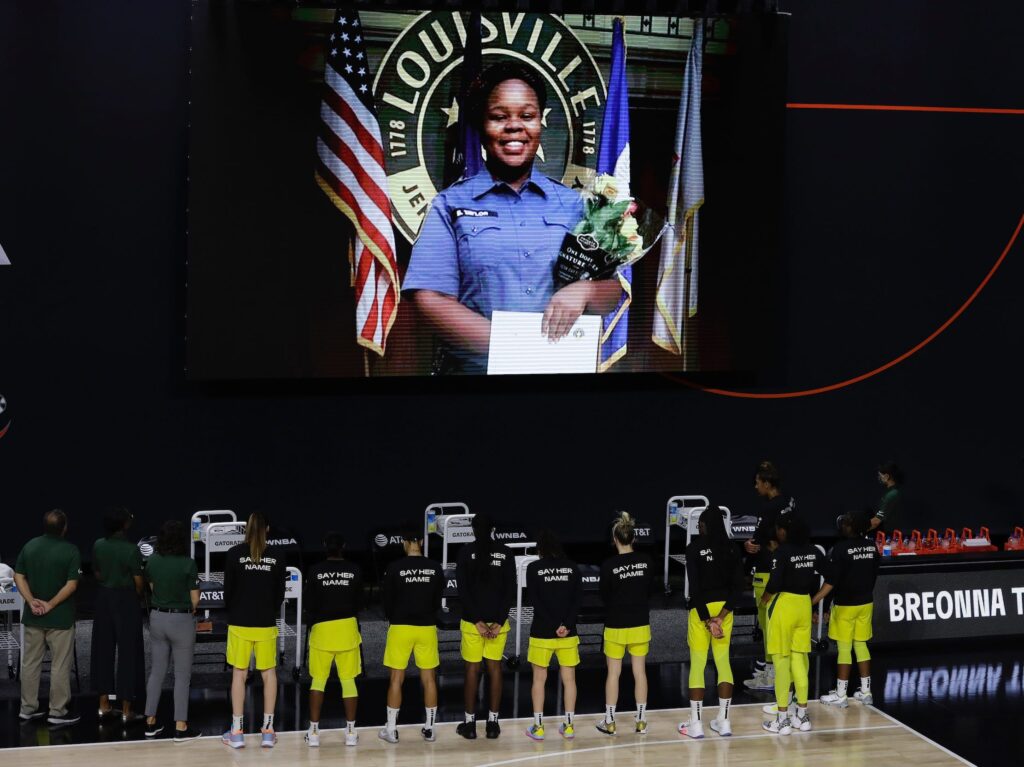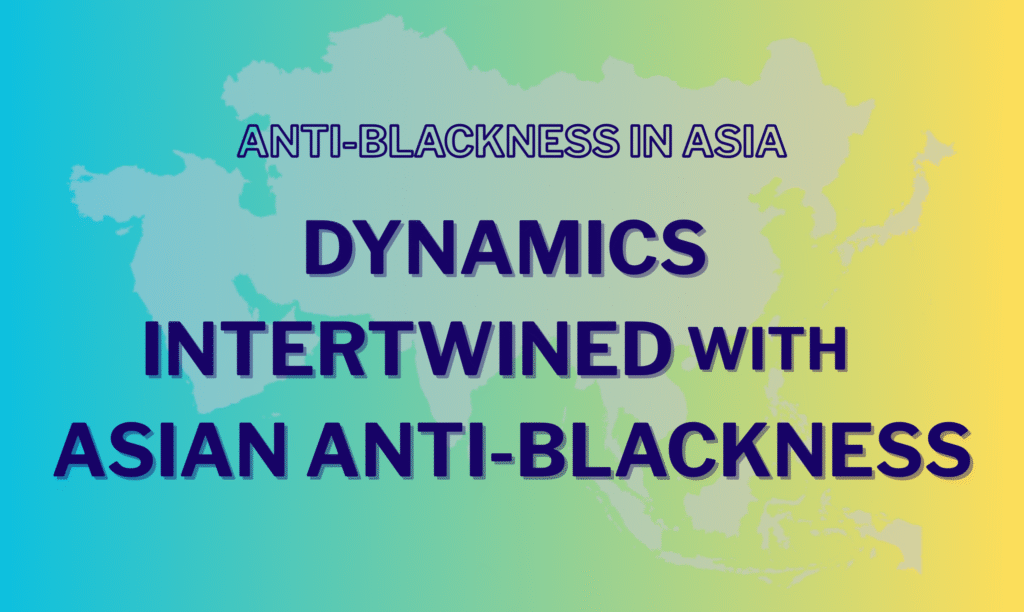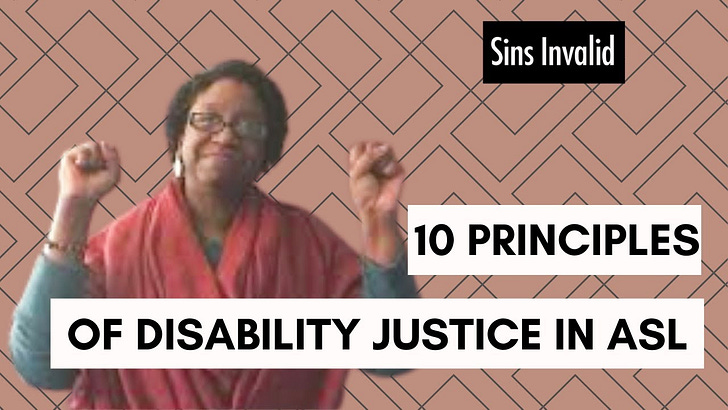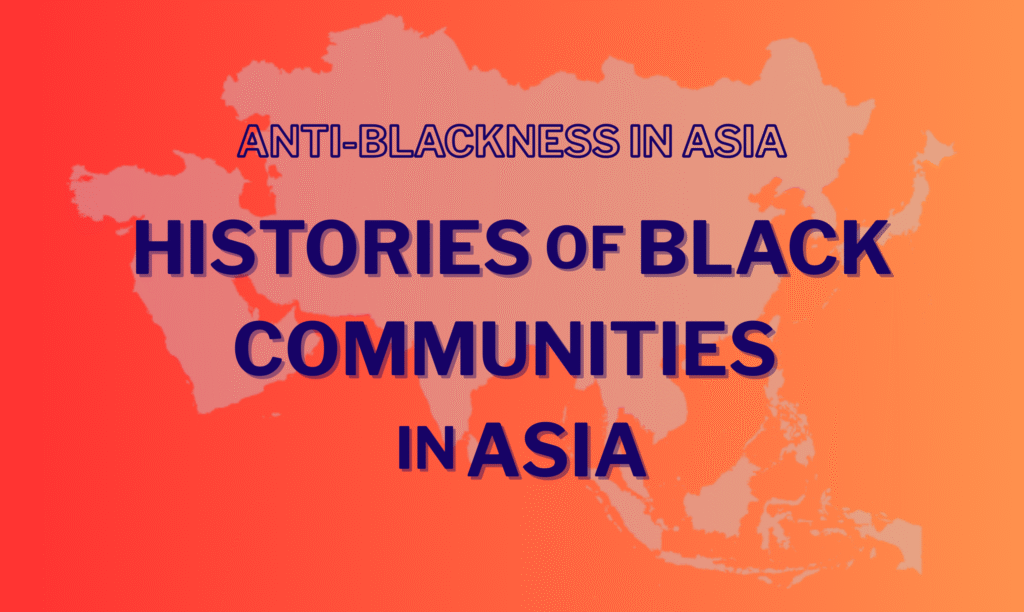WNBA players have long organized and protested for Black & brown lives
A couple weekends ago, my friend Cameron, my dad, and I watched a documentary called Power of the Dream, which was about how WNBA players rallied and used their 2020 season to uplift the movement for Black lives, bring attention to Black women who had been murdered by police like Breonna Taylor, and unseat a racist white senator in Georgia.
The documentary, just like their movement, was player-led; it was co-produced by Nneka Ogwumike and Sue Bird along with Tracee Ellis Ross, and it also heavily featured other active and retired stars Angel McCoughtry, Elizabeth Williams, and Layshia Clarendon. I highly recommend the film even if you know nothing about women’s basketball – it’s available on Amazon Prime.
This is the third in my series on Blackness and the WNBA, where I’ve previously talked about how Black women’s basketball players have been foundational leaders in the sport, despite facing racism and misogynoir that is institutionalized in the WNBA and, really, the entire women’s basketball landscape. 2020 was not the first time WNBA players have spoken up for racial justice, nor will it be the last.
Before we get more into that, a few requests.
Mutual Aid Request
I’m part of a team of friends working with two young people in Gaza, Rozan and Aboud, who are supporting both of their families as well to try and survive genocide. Given that it’s near-impossible to get out of Gaza right now, their needs are ongoing just for them to be able to have food, water, and shelter, let alone more advanced medical needs. If you enjoy this newsletter at all, please, please subscribe here to become a monthly donor supporting Rozan and Aboud’s families!
Activism Request
For folks in the U.S., you’ve hopefully been able to access the latest COVID booster – unless you’re uninsured, that is. The CDC’s Bridge Access program, which funded vaccines and boosters for uninsured adults, ended a month ago despite high COVID levels around the country. Use the People’s CDC letter template to write to Congress demanding this funding be reinstated! As always with letter templates, if you can write a few sentences at the top to personalize your letter, that helps make it more likely to be read.
2016: Black Lives Matter and the new era of athlete protest
Black athletes have a long and storied history of using their platforms fight for racial justice. But after the Civil Rights movement of the 1960s in the United States, there was a decades-long drought of athlete activism. This was the atmosphere in which professional women’s basketball grew in the 1990s and 2000s.
The rise of the Black Lives Matter movement shifted these dynamics in the 2010s, as scholar and wheelchair basketball Paralympian Georgia Munro-Cook describes:
This [decline in Black athlete activism] changed dramatically during the 2016 season. Spurred on by the police killings of Alton Sterling and Philando Castile, players from the Minnesota Lynx, including Maya Moore, held a pre-game press conference to speak out against the murders, wearing shirts that said ‘Change Starts With Us: Justice & Accountability’ on the front and ‘Black Lives Matter’ on the back. They also included the names of Castile and Sterling, and the Dallas Police shield to honour an attack on Dallas police officers that had resulted in five dead. The protest caused four Minneapolis police officers that were working the game as security to walk out, and the head of the Police Union, Bob Kroll, jeered that ‘they only have four officers working the event because the Lynx have such a pathetic draw’. The Lynx were quickly followed by the Liberty, Mercury, Mystics, and Fever, who wore black t-shirts in support of Black Lives Matter instead of their team-issued warm-up tops. This first wave of protests pre-dated NFL player Colin Kaepernick’s well-documented kneeling during the national anthem, which is often viewed as the start of a new age of athlete activism.
These protests were clearly personal for the players, and they made explicit the way that police brutality affected their lives; Tierra Ruffin-Pratt [2013–2022], who organised the Black Lives Matter T-shirts for the Mystics, made the Mystics roster in 2013 on the same day her cousin was murdered by an off-duty police officer. She told reporters ‘this whole situation has just been something close to my heart, so being part of the change is something that I want to do’. Jamieson and Choi argue that these pre- and post-game press conferences are part of the ‘brown commons,’ a ‘shared resistance and active refusal of the violences and indignations of the quotidian for/with/among brown subjects.’ The players are taking a sporting space and transforming it into a site where they can bring to light the discrimination and violence they face as Black women.

Backlash to the players’ support for Black Lives Matter came from more than just Minneapolis police officers – the WNBA tried to fine both the teams and players who had worn BLM shirts, but the player fines were twice as high as usual uniform violation fees. However, the league rescinded the fines days later, and WNBA players continued protesting for Black Lives Matter over the years, including through anthem protests in solidarity with Colin Kaepernick’s kneeling.
But one player went even further, moving her advocacy to another type of court.
2019: Maya Moore and Win with Justice
Maya Moore is one of the greatest basketball players of all time, despite only playing eight years of professional basketball. Before that, she went to UConn for college, where she won more games than any other college basketball player ever, including leading UConn to two championships and an undefeated season. Her time in the WNBA with the Minnesota Lynx also started with a bang where, after being the #1 draft pick, she won Rookie of the Year.
In her short professional career, she became one of the most decorated players in the W, leading the Lynx to four WNBA titles in 2011, 2013, 2015, and 2017. She became the first player, regardless of gender, to win three titles, Rookie of the Year, WNBA Finals MVP, and WNBA MVP within five years of playing. She’s also only one of eleven players in WNBA history to win both Rookie of the Year and WNBA MVP.
But in 2019, when Moore was 29, during what many would think of as the prime of her career, she decided to leave basketball – partially because she was burned out, but also because she wanted to devote more of her time to fighting for the release of a man named Jonathan Irons who was incarcerated in Missouri, near where Moore grew up.
Jonathan Irons was arrested in 1996 for allegedly breaking into a home and assaulting the homeowner. Despite only being sixteen years old at the time, he was tried as an adult and given a fifty-year sentence. Like so many Black defendants around the United States, he was convicted by an all-white jury without any concrete evidence that he was responsible for the charges – and even if he had been responsible for them, our prison system is fundamentally unjust, a way of warehousing, controlling, and enslaving Black, Indigenous, and other people of color without any actual support for incarcerated people to repair the harm they caused.
Moore first got to know Irons in 2007 when she was introduced to him by her godparents and extended family, all of whom got involved in advocating for his release. Moore talks about Irons and this work in this video from 2017.
So in 2019, Moore decided to step away from basketball to concentrate on that fight – and in 2020, they won. Irons was let out of prison after 24 years, and a day after he got his freedom, he proposed to Moore. They are now happily married with a baby named Jonathan Jr. Their story is the subject of an ESPN documentary called Breakaway, which I have not gotten a chance to watch because I don’t have ESPN+, and they’ve also written a joint memoir called Love and Justice: A Story of Triumph on Two Different Courts.
Moore’s work to overturn wrongful convictions didn’t end with Irons’s case. She founded Win for Justice, a nonprofit focused on prosecutorial reform, and in 2023, she announced her official retirement from the WNBA. It’s a huge loss for the basketball world, but an even bigger gain for the rights of incarcerated people everyone.
2020: The “Wubble” and the season of Breonna Taylor
Maya Moore was not the only WNBA player to prioritize social justice over basketball. In 2020, after George Floyd was murdered by Minneapolis police, WNBA stars Renee Montgomery and Natasha Cloud also stepped away from basketball to focus on fighting for Black lives. And the murder of Breonna Taylor by Louisville police not long after brought things to a head for every active WNBA player.
This is the season that was the subject of the Power of the Dream documentary, and I really do recommend that you watch it so that you can hear about it from the players themselves. But I’ll share a short (for me) summary of what went down anyway.
Due to the start of the COVID-19 pandemic, the WNBA’s 2020 season was shifted to a tournament played in a bubble (known as the “Wubble”) where all players would live in the same hotel and play in the same facility without any audience. But the players only agreed to play in the Wubble as long as they could dedicate the season to Black Lives Matter. From Munro-Cook again:
Players demanded that the 2020 season be dedicated to Black Lives Matter, Say Her Name, and getting justice for Breonna Taylor, wearing her name on the back of their jerseys all season. The players drew particular attention to Black women who had been killed by police, each week talking about a different woman during on-court interviews and pre- and post-game press conferences, answering any basketball questions by drawing attention back to social justice. The Black players wore t-shirts saying, ‘We Are Breonna Taylor,’ while others wore ‘Say Her Name’ or ‘Black Lives Matter’ shirts, emphasising the Black players’ positioning as, to quote A’ja Wilson, ‘a double minority. It’s like the world is constantly reminding us …. You’re a girl. Oh! And you’re a Black girl.’ While moving the focus onto racial justice, they continued to argue for an intersectional approach, recognising that police brutality against Black women is often under-publicised and that both their gender and race contribute to their oppression.

Not everyone was pleased by the players’ advocacy. Senator Kelly Loeffler, the white Republican owner of the Atlanta Dream who had been appointed to fill the remainder of a Georgia Senate seat, used her new bully pulpit to attack the players’ efforts and the Black Lives Matter movement, calling it violent and destructive, presumably to align herself with hardline conservatives as she ran for election that fall.
WNBA players wanted to fight back and support their colleagues on the Dream, but they realized that talking about Loeffler herself would only give more attention to her racist vitriol, potentially making her even more of a hero in the eyes of white conservatives. So instead, they decided to support one of her Democratic challengers. After vetting numerous candidates, they decided to support Reverend Raphael Warnock, who is Black, and who aligned with the WNBA players’ values on anti-racism, LGBTQ+ rights, and reproductive justice. They wore “Vote Warnock” t-shirts to their games and talked about their supportive for him every chance they could.
The Wubble season had powerful impacts: Warnock won the Georgia seat and consistently talked about WNBA players’ support being crucial to his win, and Tamika Palmer, the mother of Breonna Taylor, had similar praise, saying:
“Without these women, I don’t even know where I’d be, or how many people would’ve actually paid attention to what happened. It makes you feel like you can take a breath. You’re no longer doing it alone. And so, some days, I don’t have to stand up so straight because of them.”
2022: #WeAreBG
Just two seasons later, WNBA players would again have to rally around a carceral injustice faced by a Black woman. But this time, it was one of their own colleagues.
Brittney Griner has been one of the biggest names in women’s basketball for years, and for good reason. In her college career, she led Baylor University to a National Championship in 2012 and won the Best Female Athlete ESPY award, and she still holds the record as the only NCAA basketball player to both score 2,000 points and block 500 shots. She was selected as the #1 draft pick by the Phoenix Mercury in 2013, and in 2014 led them to a WNBA championship as well. She’s also a three-time Olympian, ten-time WNBA All Star, two-time WNBA scoring champion, eight-time WNBA blocks leader, and was named to the WNBA 25th Anniversary team in 2021. As I talked about in an earlier post, she’s also been open about her sexuality and has presented butch through her entire professional career, ushering in a new era of out players, and she has repeatedly used her platform to speak against racism, homophobia, and misogyny.
But despite Griner’s stardom, and despite her earning the league maximum, WNBA salaries are so low that even players of Griner’s fame often play overseas during the WNBA offseason to make more money. It was during Griner’s eighth season with UMMC Ekaterinburg in Russia that she was abruptly arrested at the Sheremetyevo International Airport on February 17 on drug smuggling charges for having vaporizer cartridges containing less than a gram of hash oil from medicinal cannabis.
Griner’s arrest came just after the U.S. and many other countries had imposed sanctions because of Russia’s invasion of Ukraine. But the subtext of Griner’s imprisonment went beyond her status as an American: as a Black, queer, masculine-presenting woman, many felt that she was also being uniquely punished. This was only reinforced after her trial, where she was sentenced to nine years in prison and over $16,000, even though the standard sentence in Russia for possession of less than 2 grams of hash oil is only 15 days.
Racism was also likely a factor in how the U.S. treated Griner’s imprisonment. Despite classifying her case as wrongful detention, it took until July 6 – almost six months after Griner’s arrest – for President Joe Biden to even call Griner’s wife Cherelle to discuss her case. By that time, Cherelle had already said publicly that she had lost trust in the U.S. government because the first time she was supposed to be able to speak to her wife, on their fourth wedding anniversary in June, the U.S. embassy in Russia, after weeks of planning the call, failed to have any staff in the office over the weekend to facilitate it.
WNBA players, however, rallied around Griner and her family. In spring 2022, WNBA officials and players had been told by the State Department not to speak about Griner’s imprisonment publicly for fear that it would negatively impact the negotiations for Griner’s release. But by the time WNBA games started in May, those concerns were gone, and the movement to free Griner saturated every part of that season. All twelve teams had large “BG 42” decals placed on their home courts; players talked about her every chance they got, from televised statements to interviews to social media. The players’ union, the WNBA Players’ Association, called publicly for people to call or write the White House and their elected officials to demand Griner’s freedom. And a grassroots movement arose to support this fight as well, primarily made up of Black women-led groups.

It was not until December 8 – after Griner had been detained for 294 days – that U.S. officials finally announced she’d been freed in a prison swap. Monica Simpson, the executive director of SisterSong, which had been involved in the #WeAreBG movement, celebrated the news but also grounded it in its racist context, saying:
“Black, queer, trans, women and many communities that are pushed to the margins by systems rooted in white supremacy and patriarchy are constantly navigating violence, unjust criminalization and threats to our human rights. Brittney’s treatment is just one example among too many of this reality … We honor the Black women like Brittney’s wife Cherelle, who fought tirelessly to bring her back. Welcome home, Brittney, we missed you.”
2024: What now?
Natasha Cloud and Layshia Clarendon are two of the strongest voices for social justice in the WNBA. Cloud has been involved with gun reform for years and sat out the 2020 season to organize for Black Lives Matter in Washington D.C.; Clarendon was one of the leaders within the Wubble, helped found the WNBA Social Justice Council, and created their own foundation to improve healthcare for trans folks.

Cloud and Clarendon are also among a very small group of WNBA players who are advocating to free Palestine. Clarendon shared messages of solidarity with Palestinians during Israel’s assault on Gaza in 2021, and during Israel’s current genocide in Gaza, Cloud and Clarendon have joined Kierstan Bell as the only active WNBA players to sign onto Athletes for Ceasefire. (The letter was also signed by Amanda Zahui B., who has previously played in the W but is not rostered with a team this season, and Jasmine Thomas, a retired player who is now the Director of Player Programs and Development Coach for the Dallas Wings.) They’ve both been vocal on social media and interviews about their support for Palestine – and their disappointment that neither the league nor their teammates are joining them.
Cloud drew on the history within the W of fighting for racial justice – and the history of solidarity between the Black liberation and Palestinian liberation struggles – to express her frustration in an interview with Andscape:
“We understand the struggle. There are so many similarities in the Palestinian struggle and the African American struggle here in the United States. If we can’t see that and if we can’t care about other people, how do we expect people to fight for us when we’re saying Black Lives Matter, right?
…We’ve shown time and time again, not only in our league but in sports as a whole, that we have the ability to bring people together. S—, we saved our democracy in 2020. So, we have that power to change. We had that power to bring Brittney Griner home. Those are all things that we know we are capable of. So the fact that we’re still silent seven months later [after the escalation of the conflict], I am very disappointed.”
WNBA players continue to be some of the most committed to social justice and activism out of all professional athletes in the U.S. But watching this season has often felt tough, not only because of the silence on the genocide in Palestine, but because of the racism from basketball fans and media and the failure by white WNBA leaders to fight it. Just last week, WNBA Commissioner Cathy Engelbert was asked in an interview about the escalation in racist and homophobic vitriol on social media, including in fights between fans of Caitlin Clark and Angel Reese. Engelbert didn’t address racism and homophobia at all, instead turning the question into one about rivalries, which she said sports needs.
Engelbert originated the role of WNBA Commissioner – the highest executive in the league – in 2019, which means she was there for at least the Wubble season and Brittney Griner’s imprisonment. She absolutely knows better. But despite players and the WNBPA calling her out for her own racism here, she will likely face few consequences for it, because the WNBA’s financial growth is seen as more important by the league, team owners, and mainstream media than anti-racism – even when that anti-racism is directly about protecting their own players.
The WNBA’s growth is only important to me in the ways it benefits the players and the things that are most important to them. We need to do a better job of honoring the legacy of Black and queer WNBA players in fights for racial justice, which are not separate from women’s basketball, but are a crucial part of it – and also holding those who are silent on injustices to that same standard.







